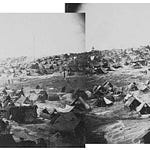Originally published on September 30, 2020 (Episode 179)
Introduction
In 415 BC, Athens sent a fleet of over 100 ships and 5,000 hoplites to attack the city of Syracuse in Sicily—an expedition that would end in catastrophe.
Decades later, the philosopher Plato described a drinks party, given by the poet Agathon to celebrate his victory at the Lenaia festival. Among Agathon’s guests was Socrates, the philosopher and gadfly of Athens. Later in Plato’s telling, the uninvited Alcibiades—brilliant, reckless, and the chief mover of the Sicilian Expedition—burst in to join the feast.
Any Athenian reader would have known the deeper connections: that Alcibiades had been a student of Socrates; that he had been exiled not once, but twice; and that Socrates himself had been executed for “corrupting the young”—young men like Alcibiades.
With me to discuss what Alcibiades learned from Socrates, and the broader question of political ambition, is Ariel Helfer, author of Socrates and Alcibiades: Plato’s Drama of Political Philosophy and Ambition.
About the Guest
Ariel Helfer is Assistant Professor of Political Science at Wayne State University. His research focuses on the history of political thought, classical philosophy, and the intersections of ambition, ethics, and leadership. He is the author of Socrates and Alcibiades: Plato’s Drama of Political Philosophy and Ambition (University of Pennsylvania Press, 2017).
For Further Investigation
Ariel Helfer, Socrates and Alcibiades: Plato’s Drama of Political Philosophy and Ambition (2017)
Robert K. Faulkner, The Case for Greatness: Honorable Ambition and Its Critics (2008)
Steven Forde, The Ambition to Rule: Alcibiades and the Politics of Imperialism in Thucydides (1989)
Jacqueline de Romilly, Life of Alcibiades: Dangerous Ambition and the Betrayal of Athens (2019)
Plato, Alcibiades I, Alcibiades II, Symposium (212c–223b); Aeschines of Sphettus: Alcibiades, trans. David M. Johnson (2003)
Plutarch, “Life of Alcibiades” in Lives, vol. 4, trans. Bernadotte Perrin (1916)
Thucydides, The Landmark Thucydides: A Comprehensive Guide to the Peloponnesian War, ed. Robert B. Strassler (2008)
Listen & Discuss
What do you think Socrates hoped to teach Alcibiades—and what did Athens learn instead? Share your thoughts in the comments, and forward this episode to a friend who loves political philosophy.











